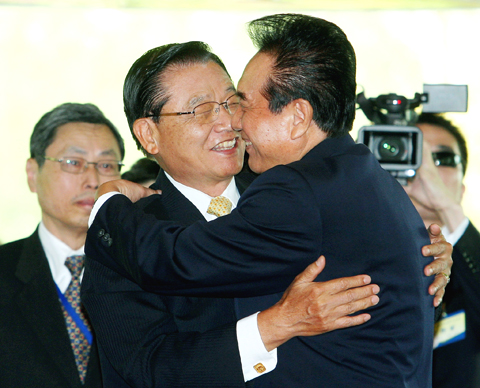Straits Exchange Foundation (SEF) Chairman Chiang Pin-kung (江丙坤), the nation’s chief negotiator with China, arrived in Nanjing, China, yesterday morning on a mission to seal three agreements and one joint statement with China.
The highlight of Chiang’s visit will be a meeting today with his Chinese counterpart, Association for Relations Across the Taiwan Strait Chairman Chen Yunlin (陳雲林).
The two sides are expected to sign three agreements on the launch of regular cross-strait passenger flights, financial cooperation and mutual judicial assistance and cross-strait cooperation to fight crime. Any consensus reached on opening Taiwan to Chinese investment would be covered in a joint statement.

PHOTO: CNA
Representatives of the SEF and ARATS held a preparatory meeting yesterday to finalize the text of the agreements and the joint statement.
Mainland Affairs Council Chairwoman Lai Shin-yuan (賴幸媛), who was at Taiwan Taoyuan International Airport to see off Chiang and his delegation, promised that the SEF’s negotiations with ARATS would be conducted in accordance with the principles of equality and dignity and would uphold the interests of Taiwan and its people.
During the talks, Chiang is also likely to raise a proposal for Taiwan and China to sign an economic cooperation framework agreement (ECFA) as instructed by President Ma Ying-jeou (馬英九) during their meeting on Friday.
Ma has argued that if Taiwan does not sign such an agreement with China, it risks being marginalized and losing its competitiveness because China and neighboring countries are planning to sign free-trade agreements.
Critics, however, warned that the ECFA could jeopardize Taiwan’s sovereignty and make it too economically dependent on China.
Defining the ECFA as an accord about “tariff reduction” and “fair trade,” Lai yesterday said it was essential to normalizing cross-strait trade.
Addressing concerns about the negative impact of the ECFA on local businesses, Lai said in an interview with a radio station in Taichung yesterday that there would be supplementary measures in place and that the government would only open industries that could benefit from and attract Chinese investment.
They will not include industries involved in high-tech development or national security, she said.
A pact on judicial assistance and cooperation to fight crime will allow for the repatriation of Taiwanese fugitives in China to face justice, she said. Of the 85 major Taiwanese economic criminals who have fled to China over the past 10 years, only one has been returned to Taiwan, she said.
Lai said the two sides would also discuss “fifth freedom of the air,” or the right of airlines to operate connecting flights, during the Chiang-Chen meeting, but it would not be the focus of the meeting because of its technical complexity.
Fifth freedom of the air means that an airline can carry passengers from one country to another, and then on to a third country. Beijing has been reluctant to discuss the matter because it touches on the issue of sovereignty.
Also See: Financial deal is ‘ticket’ to Chinese market: FSC head

NATIONAL SECURITY THREAT: An official said that Guan Guan’s comments had gone beyond the threshold of free speech, as she advocated for the destruction of the ROC China-born media influencer Guan Guan’s (關關) residency permit has been revoked for repeatedly posting pro-China content that threatens national security, the National Immigration Agency said yesterday. Guan Guan has said many controversial things in her videos posted to Douyin (抖音), including “the red flag will soon be painted all over Taiwan” and “Taiwan is an inseparable part of China,” while expressing hope for expedited “reunification.” The agency received multiple reports alleging that Guan Guan had advocated for armed reunification last year. After investigating, the agency last month issued a notice requiring her to appear and account for her actions. Guan Guan appeared as required,

A strong cold air mass is expected to arrive tonight, bringing a change in weather and a drop in temperature, the Central Weather Administration (CWA) said. The coldest time would be early on Thursday morning, with temperatures in some areas dipping as low as 8°C, it said. Daytime highs yesterday were 22°C to 24°C in northern and eastern Taiwan, and about 25°C to 28°C in the central and southern regions, it said. However, nighttime lows would dip to about 15°C to 16°C in central and northern Taiwan as well as the northeast, and 17°C to 19°C elsewhere, it said. Tropical Storm Nokaen, currently

‘NATO-PLUS’: ‘Our strategic partners in the Indo-Pacific are facing increasing aggression by the Chinese Communist Party,’ US Representative Rob Wittman said The US House of Representatives on Monday released its version of the Consolidated Appropriations Act, which includes US$1.15 billion to support security cooperation with Taiwan. The omnibus act, covering US$1.2 trillion of spending, allocates US$1 billion for the Taiwan Security Cooperation Initiative, as well as US$150 million for the replacement of defense articles and reimbursement of defense services provided to Taiwan. The fund allocations were based on the US National Defense Authorization Act for fiscal 2026 that was passed by the US Congress last month and authorized up to US$1 billion to the US Defense Security Cooperation Agency in support of the

PAPERS, PLEASE: The gang exploited the high value of the passports, selling them at inflated prices to Chinese buyers, who would treat them as ‘invisibility cloaks’ The Yilan District Court has handed four members of a syndicate prison terms ranging from one year and two months to two years and two months for their involvement in a scheme to purchase Taiwanese passports and resell them abroad at a massive markup. A Chinese human smuggling syndicate purchased Taiwanese passports through local criminal networks, exploiting the passports’ visa-free travel privileges to turn a profit of more than 20 times the original price, the court said. Such criminal organizations enable people to impersonate Taiwanese when entering and exiting Taiwan and other countries, undermining social order and the credibility of the nation’s